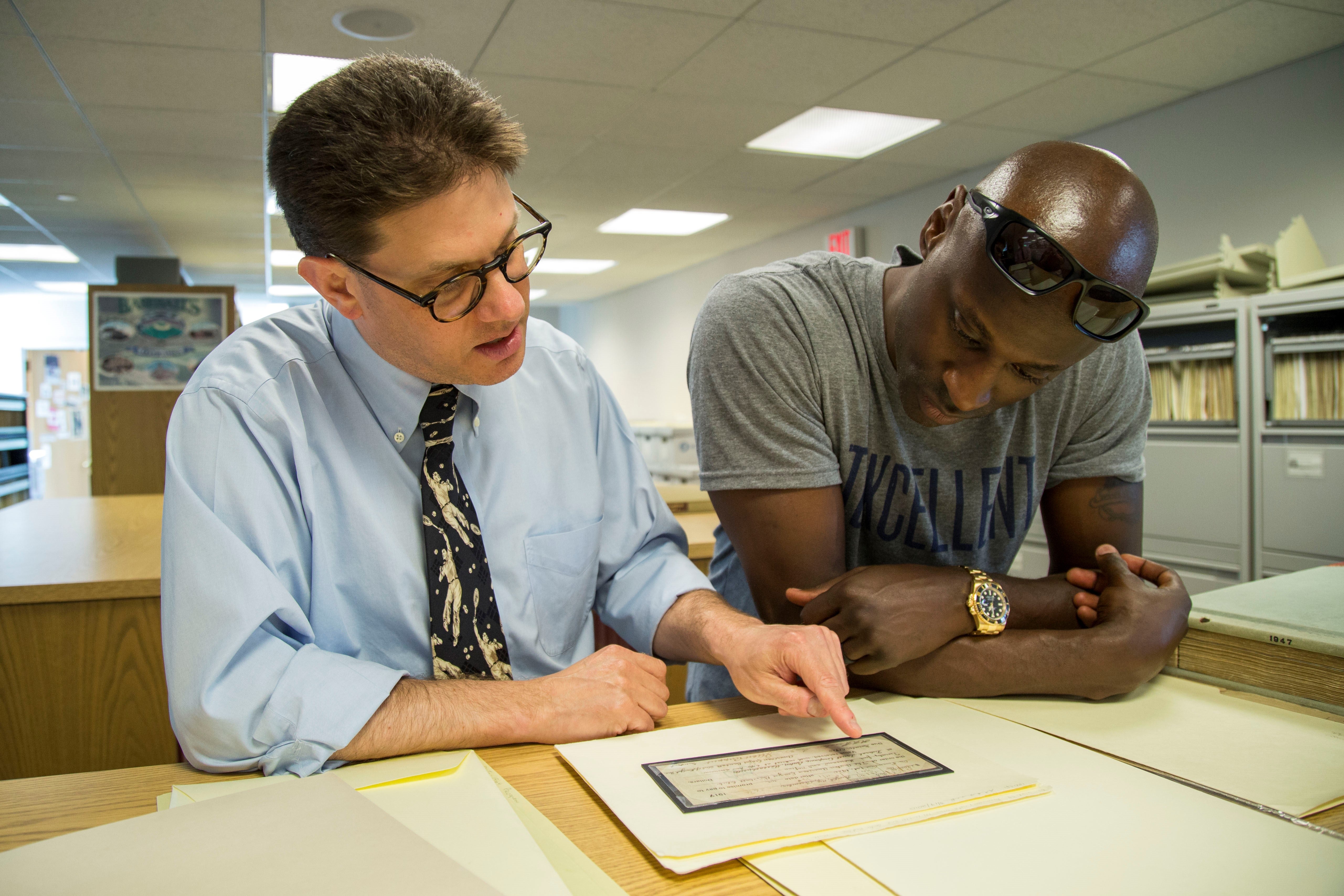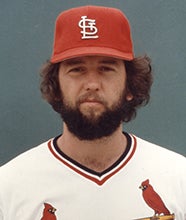- Home
- Our Stories
- Former pinch-hitting specialist Greg Gross enjoys history at Hall of Fame
Former pinch-hitting specialist Greg Gross enjoys history at Hall of Fame
Greg Gross, who has spent more than four decades in professional baseball as either a player or coach, wanted to spend part of this offseason in Cooperstown.
Accompanied by wife Konnie, the two began a three-day trip with a visit to the National Baseball Hall of Fame and Museum on the morning of Wednesday, Nov. 16. After a 90-minute behind-the-scenes tour, the longtime big leaguer was smiling.
“It’s sort of surreal to see all of the things that are here – the history,” Gross said. “I grew up loving the game, still in the game after all these years, still get excited every spring when it starts again, and hopefully can do it for a long time, but to see all the artifacts that are here is just a little overwhelming really.
“I was here about 30 years ago just for a quick trip and I was here once when I was coaching with the Phillies for the 2003 Hall of Fame Game, but I was never here to spend the time like I’m going to these three days,” he added. “It’s only about four hours away from our home outside Philadelphia, so we just decided to get away. And if we were going to do this we wanted to take our time and just go through and really enjoy it and really see the history of the game.”
“It’s sort of surreal to see all of the things that are here – the history,” Gross said of visiting the Hall of Fame. “I grew up loving the game, still in the game after all these years, still get excited every spring when it starts again, and hopefully can do it for a long time, but to see all the artifacts that are here is just a little overwhelming really." (Milo Stewart Jr. / National Baseball Hall of Fame)
Gross, a native of Pennsylvania, has seen plenty of history during his time in the game. He spent 17 seasons in the majors as an outfielder and pinch-hitter, spending time with the Astros (1973-76, 1989), Cubs (1977-78) and Phillies (1979-88). His career numbers included 1,073 hits, a .287 batting average, and a .372 on-base percentage, but may be best remembered for his ability to perform off the bench as his 143 pinch-hits ranks fifth all-time behind Lenny Harris (212), Mark Sweeney (175), Manny Mota (150) and Smoky Burgess (145).
“A lot of guys looked at pinch-hitting as not being good enough to play or a demotion, but I didn’t,” Gross said. “The best way to explain it is that when I went into that role I went to a contending club with the Phillies. I think that made the adjustment easier because you were part of a team that was expected to win and everybody on the team had a role in order to get to that final goal.”
Gross was a lefty-swinging starting outfielder during his early years with the Astros, even finishing second to future Phillies teammate Bake McBride in the 1974 National League Rookie of the Year voting, but became an integral part-time player during his 10 seasons with the Phillies, helping them capture the 1980 World Series and the 1983 National League pennant.
“Steve Carlton and Mike Schmidt, both Hall of Famers, were at the top of their games during those early years with the Phillies,” said Gross, sporting his 1980 World Series ring. “You just watched how those guys prepared. And watching those guys you never knew if they were hitting .300 or whether they were 15-2 or 2-15, their demeanors never changed.
“And I later played with Hall of Famers Joe Morgan and Tony Perez with the Phillies at the end of their careers. I had played against them when they were with Cincinnati. They got hot when it got down to the end where we were fighting for a pennant in 1983. Those two guys sort of caught fire and had that one last run. Were they the same players they were years ago? No. But they got big hits during key at-bats.”
Greg Gross, accompanied by his wife Konnie and Erik Strohl, the Hall of Fame’s vice president of exhibitions and collections, has spent more than four decades in professional baseball as either a player or coach. Gross took a 90-minute behind-the-scenes tour during their visit to the National Baseball Hall of Fame and Museum. (Milo Stewart Jr. / National Baseball Hall of Fame)
Gross, who said he enjoyed facing Expos righty Steve Rogers but remembered Pirates southpaw John Candelaria as being especially tough, began his big league career by not homering in his first 1,887 plate appearances before finally going deep as a member of the Cubs while playing at Wrigley Field in July 1977.
“I spent two seasons with Chicago before they had lights, obviously, and the way the city treated the Cubs was fantastic and something I’ll never forget,” he said. “And it was phenomenal to watch future Hall of Fame closer Bruce Sutter come into games and just dominate. He’d come in and pitch three innings sometimes. To be able to do what he did in that ballpark was amazing.
“And to see the Cubs finally win the World Series this year was pretty exciting, too. I was happy for them.”
For the past two decades Gross, 64, has been able to share his batting knowledge as both a major and minor league hitting coach with the Rockies, Phillies and Diamondbacks, most recently working with Arizona’s Triple-A affiliate in Reno, Nevada, since 2013.
“I still like coaching and physically I’m still able to do it, so unless something happens I can see myself doing it for another year or so,” Gross said. “As far as my role as hitting coach, I think as the way the game has evolved now it’s more psychology than it is anything. Everybody gets caught up in mechanics and a lot of times that creates a lot of problems.
“I always thought as a player my strength was I wasn’t the most physically gifted guy – speed, power, whatever – so I thought my edge was finding a way to fit in in a niche and be successful at it and have a long career, which I did. And I thought a lot of it was how you approach it mentally. I think that’s what helped me and hopefully I can pass some of that along to some of the younger guys.”
As for spending most his adult life in baseball, Gross says he doesn’t regret anything.
“I had a good run,” he said. “I had fun in Houston, when I got traded from Houston I played for the Cubs and got treated like a king, then I got traded to Philadelphia which was both close to home and a winning club. As far as coaching, I’ve had three pretty good stops with the Rockies, the Phillies and now with the Diamondbacks.”
Bill Francis is a Library Associate at the National Baseball Hall of Fame and Museum
Related Stories
Hall of Justice: David Justice visits Cooperstown

Rockies pitcher LaTroy Hawkins visits the Hall

Crane Game: Kelsey Grammer visits Hall of Fame
Hall of Justice: David Justice visits Cooperstown

Rockies pitcher LaTroy Hawkins visits the Hall







